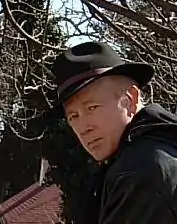
A. Ryan Allen (May 15, 1943 – December 11, 2018[1]) was an American bass singer best known for his work in opera. He performed professionally in all 50 states, appeared with numerous American opera companies, and sang as a soloist in Russia, Israel, Poland, Norway and Sweden.
Career


The singer debuted at the Metropolitan Opera[3] in 1993 as Hans Foltz in Die Meistersinger von Nürnberg by Richard Wagner. Coming to opera from the field of acting, the bass's repertoire favored roles with character development and stage movement. These roles ranged from the comic Don Basilio[4] in Il barbiere di Siviglia by Gioacchino Rossini to the pathetic Candy[5] in Of Mice and Men by Carlisle Floyd. Allen also appeared as an oratorio soloist with various symphony orchestras and oratorio societies. In 1989 he debuted at Carnegie Hall, singing the bass solos in Mozart's Requiem.[6]
Allen was a lyric bass capable of singing the deepest pitches composed in opera. He performed the role of Seneca[7] in L'incoronazione di Poppea by Monteverdi, which requires a low D.[8] Although primarily an exponent of the great buffo roles, the bass demonstrated versatility. He performed not only in opera and oratorio, but also in the musical theater field (Judge Turpin in Sweeney Todd)[9] and the operetta field in Gilbert and Sullivan roles, such as the title character in The Mikado.[10] The ability to sing in diverse musical styles was underscored when he sang A Kurt Weill Cabaret with Martha Schlamme.[11] He participated in several world premieres, including My Friend's Story by Martin Bresnick at the International Festival of Arts and Ideas,[12] Holy Blood and Crescent Moon by Stewart Copeland with the Cleveland Opera, and The Cask of Amontillado by Russell Currie[13] with the Bronx Arts Ensemble in the Bronx, New York, followed by revivals off-broadway at the Vital Theater, Golden Fleece, Ltd. and Symphony Space. Caliban, a monodrama using the words of the character Caliban from Shakespeare's The Tempest, was written for and dedicated to him by Russell Currie. Ryan Allen can be heard as Elviro on a 1994 recording of Handel's Xerxes (Koch Schwann), in recordings of Russell Currie's music on the High Fire label, and seen as Betto on a video of Gianni Schicchi (Metropolitan Opera Guild).
Education
Born in South Carolina, Allen attended school in Columbia, the city of his birth, and Dallas, Texas, graduating from the latter at Thomas Jefferson High School. He demonstrated talent early, singing the lead in his junior high school musical while still a boy soprano. In high school, he played as first trombone in the band and sang in the A Cappella Choir. After receiving a Bachelor of Arts degree in English from Austin College in Sherman, Texas, and a Master of Music degree in Vocal Performance from the University of Texas at Austin, the bass continued his training in the Merola Opera Program[14] and with Boris Goldovsky. He lived in Charleston, South Carolina.
Notes
- ↑ A. Allen Obituary. J. Henry Stuhr Downtown Chapel, Charleston SC. Retrieved 2018-12-18.
- ↑ Ciletti, Elena (3 August 2012), "'The Barber of Seville' smiles at the Smith Opera House", Finger Lakes Times, pp. 4B, retrieved 3 August 2012
- ↑ The Metropolitan Opera Archives. "Metopera Database:". pp. Keyword Search: Ryan Allen, performance date, January 23, 1993. Archived from the original on June 16, 2009. Retrieved 2008-02-13.
- ↑ Elyse Sommer (July 5, 1999). "A Curtain Up Opera Review, Il Barbiere di Siviglia". Curtain Up. Retrieved 2008-08-06.
- ↑ "Bleak story of shattered men makes edgy opera," D.T. Baker, Edmonton Journal, B6.
- ↑ NYTimes.com, Review/Music, 10 Choruses From Across the Nation
- ↑ milwaukeesfs: University of Wisconsin Milwaukee Opera, The Coronation of Poppea. Archived 2011-08-22 at the Wayback Machine
- ↑ Dutch Divas – the high C Archived 2008-03-08 at the Wayback Machine
- ↑ "Indianola, IA," Derek M. Mills, Opera News, December 9, 1995, p. 56.
- ↑ "'Mikado' opera is delightfully absurd," David Stabler, The Oregonian, May 15, 2000, Entertainment Section, p. 1.
- ↑ "Schlamme and company do justice to Weill's genius," Arden Anderson Broeking, Darien News-Review, March 8, 1984, p. 10.
- ↑ "International Festival of Arts and Ideas" (PDF). Retrieved 8 July 2016.
- ↑ The New Grove Dictionary of Music and Musicians, edited by Stanley Sadie and John Tyrrell, 2004. Copyright: Macmillan Publishers Limited, 1980
- ↑ "Merola Alumni". Merola Opera Program. Archived from the original on 11 June 2012. Retrieved 16 August 2012.